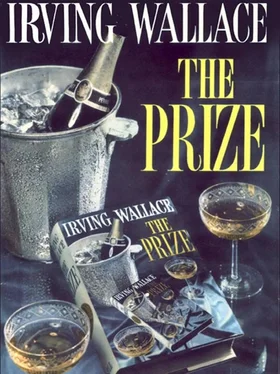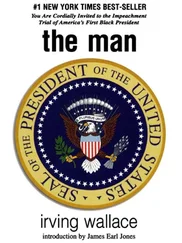Stratman advanced to a chair, and held it for support. ‘This wrangling, Count Jacobsson, this passionate debate you speak of-can you give any other specific instances?’
‘To discuss this year’s or last year’s closed meetings might be improper,’ said Jacobsson, ‘but I suppose there is nothing wrong with relating a few historic disagreements. I relish them, and do not mind sharing them.’ He noticed the physicist’s weariness, and said suddenly, ‘Please, Herr Professor-in fact, everyone-sit down for a few minutes while we talk. Take the chairs. This is not a museum-the chairs are for use.’
Quickly, he helped Stratman off his feet, while Craig held a seat for Emily, and Mr. Manker and Flink vied to assist Leah. Soon, everyone was at rest around the long table. Jacobsson settled himself at the head, before the bust of Gustavus III.
‘You know,’ said Jacobsson, ‘on many days every November and December, people all over the world pick up their newspapers and read of Nobel Prize winners. They come to believe, without thinking, that the laureates are demigods, and that the award is divinely ordained, but I am the first to admit that the winners, often geniuses and saints, are not demigods but human beings. At the same time, I am also the first to admit that the awards are neither divinely ordained nor decided by judges endowed with superior wisdom, but rather they are voted upon by ordinary men, of fine intellect, but of human frailty. I make these preliminary remarks because you wish to know what has gone on in this room, in secret sessions behind locked doors-and to appreciate what I will tell you, you must understand that our eighteen, like members of the other prize-giving committees, are merely mortals, after all. Most are experienced and knowledgeable men and women of scholarship and objectivity and great integrity. But, I repeat, they are mortals-they have personal prejudices, likes and dislikes, neuroses, vanities. They can be influenced by others, and influence one another. They can be bold, and they can be frightened. They can be cosmopolitan, and they can be provincial. They can be overspecialized in one area, and completely ignorant in another. But all of this considered, they are the best eighteen minds in this field that we have to offer. Once appointed, they serve for life, and to a man, they are the dedicated servants of Alfred Nobel’s will. They are the judges of an Academy which has honoured Rudyard Kipling, Gerhart Hauptmann, Romain Rolland, Anatole France, George Bernard Shaw, Sigrid Undset, Thomas Mann, Bertrand Russell, and Boris Pasternak. They are also the judges of an Academy which has ignored or rejected Émile Zola, Leo Tolstoy, Henrik Ibsen, Marcel Proust, Mark Twain, Joseph Conrad, Maxim Gorki, Theodore Dreiser, and August Strindberg. You see, they are wise, and they are f oolish, but no wiser and no more foolish than other men.’
Craig caught Jacobsson’s attention. ‘Your selections I understand,’ said Craig, ‘and for the most, I heartily approve-my own included.’
Leah, Flink, and Stratman laughed appreciatively, and Jacobsson permitted a flitting smile to cross his wrinkled features.
‘But I still don’t understand your omissions,’ Craig went on. ‘Some of them were brought up at the press conference yesterday. They seem to be brought up everywhere, and often, and never answered. Why didn’t Zola and Tolstoy win one of the early prizes? Why weren’t Ibsen and Strindberg, two of your own, ever honoured? Was it that the judges, at the time, were dunderheads? Or were actual pride and prejudice involved?’
‘Ah, I was coming to that,’ said Jacobsson, ‘I was leading up to that. Yes, generally it was prejudice-sometimes pride-often politics and weakness. Let us consider the specific names you have mentioned. Émile Zola was alive until 1902, and therefore twice eligible for the Nobel Prize. It is a fact that he was officially nominated for the first award by Pierre Berthelot, the celebrated French chemist. But, you see, Alfred Nobel had died only five years before, and his powerful ghost cast a long and influential shadow over the Academy members. In his lifetime, Nobel had detested Zola’s Nana and the rest of his naturalist novels. Nobel considered them too-how shall I put it?-too earthy, coarse, realistic. Do not forget, in his will Nobel offered the literary prize for “the most oustanding work of an idealistic tendency”. In Nobel’s opinion, Zola had been anything but an idealist, and the Nobel judges knew this, and they had to consider the benefactor’s tastes in disposing of his money.’
‘That I can understand,’ agreed Craig. ‘For the first time, the omission makes sense.’
‘You spoke of Tolstoy, Ibsen, Strindberg,’ continued Jacobsson. ‘Here, it was largely the strong prejudices of one man-one judge-who kept all of them out.’
Craig did not hide his surprise. ‘Actually?’
‘Yes, yes,’ said Jacobsson. ‘Certainly, there were other factors. Not only were the Academy members handicapped by the idealism edict, but they were conservative and poorly read. That was long ago, and I think we can admit it today. The majority of the judges were limited in their literary outlook. They were historians, religionists, philologists. Only three of them, I believe, knew anything of literature. One of these, a remarkable man, a poet and a critic, was Dr. Carl David af Wirsén. When the Academy took over the Nobel awards, Wirsén was its chairman, its most powerful figure. He was about fifty-eight at the time, wise and learned, but a person of strong personal prejudices. As an example of his control of the Academy, I need only cite what occurred in 1907. When the Academy loses one of its eighteen, and elects a replacement for life, the King must give his routine approval. In 1907, a new member, an eminent literary historian, was elected over Wirsén’s objection that the new member had once committed lèse-majesté by publishing a volume critical of Gustavus III, the Academy’s founder. When Wirsén found that he had been overruled, he went to King Oscar II and persuaded him to veto the new member-and the new member did not get in until Gustaf V was on the throne. That was the power of Wirsén. And it was he who kept out Tolstoy.’
‘How could he do it?’ asked Emily.
‘It is not easy to explain, Miss Stratman, but let me see if I can,’ said Jacobsson. ‘The French Academy had nominated a relatively unknown poet, Sully Prudhomme, for the first award. The Swedish Academy was impressed by its French counterpart. Furthermore, our judges wanted a safe, uncontroversial choice. So they gave Prudhomme the first prize. The literary world was shocked. Even here in Sweden. Forty or fifty Swedish writers and artists castigated the Academy and offered a petition favouring Tolstoy. As a matter of fact, Tolstoy could not have been elected that first year, because no one had officially nominated him. This oversight was repaired the second year. Tolstoy was, indeed, nominated in 1902. But now Wirsén, the chairman of the Academy, came into the picture. I have seen the minutes of the stormy meeting when the judges had to select a laureate from among Mommsen, Spencer, and Tolstoy. It was Wirsén, almost single-handed, who struck down Tolstoy. Wirsén admitted that War and Peace was an immortal work. But he charged that Tolstoy’s later writings were sensational and stupid, that Tolstoy condemned civilization, that he advocated anarchism, that he had the effrontery to rewrite the New Testament, and, greatest crime of all, that he had denounced all money prizes as harmful to artists. Wirsén’s fiery diatribe carried the day, and the great Russian was defeated, and although he lived through eight more awards, he was never again a serious candidate.’
‘And Ibsen and Strindberg?’ asked Craig.
Читать дальше












